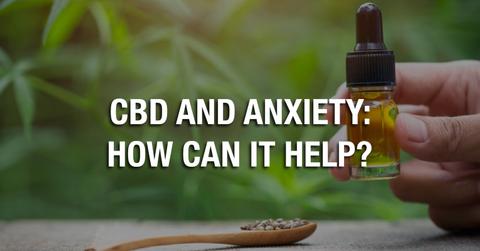 NEWS
NEWSAnxiety and CBD

Dec. 3 2020, Published 5:08 p.m. ET
Anxiety and CBD
Do you feel stressed? Are you worried about something in the future or about the repercussions of a past interaction? Have no fear. Anxiety is a natural, automatic response to stressful stimuli, and it is a perfectly normal condition. While there are varying intensities of anxiety with numerous FDA-approved medical treatments, CBD can help to dampen the symptoms of anxiety. This article takes a look at anxiety and its symptoms. It then delves into CBD and how CBD’s interaction with the body’s receptors makes it a viable option for treating anxiety.
What is Anxiety?
Let us reiterate: above all else, anxiety is both natural and normal. Anxiety, per the American Psychological Association (APA), is an emotion involving feelings of tension and worry. Anxiety can also manifest itself in physical attributes, such as heightened blood pressure. While these conditions are ordinary, sustained symptoms can progress into a severe mental disability, called anxiety disorder, which impairs everyday life. It is essential to know the differences between daily anxiety and anxiety disorder.
Anxiety
The human parasympathetic nervous system relays messages to the brain when it feels endangered. This mechanism is critical for human survival, causing our bodies to temporarily boost their adrenaline levels to respond with fight-or-flight behavior. Symptoms of anxiety can include an elevated heart rate, heightened sensitivity to the physical environment, and sweating.
Today, family relationships, health, money, work, and other attention-demanding issues can cause anxiety without necessitating a fight-or-flight response. However, a person’s anxiety about being harmed—for example, the worry of burning one’s hand when touching a hot stove—can be critical in that person’s well-being.
Anxiety Disorder
If the duration or magnitude of feelings of anxiety are heightened, you may have anxiety disorder. Increased blood pressure, shakiness, nausea, and recurrent intrusive thoughts or worries can be signs of anxiety disorder, and medical attention is recommended. Other symptoms of generalized anxiety disorder can include irritability, restlessness, difficulty concentrating, respiratory problems, loss of libido, loss of appetite, chronic fatigue, depression, and a feeling of being on-edge.
The causes of anxiety disorder can include hormonal imbalance, genetic inheritance, environmental stressors (work or relationship issues), complications from other medical conditions, and substance withdrawal.
Long-Term Effects of Anxiety
Over time, the stress hormones released by your brain can accumulate, causing depression, dizziness, and migraines. While adrenaline and cortisol are vital for short-term, high-stress situations, a build-up of these chemicals can be physically harmful and cause weight gain over long periods.
Prolonged anxiety can also cause cardiovascular complications, such as increased heart rate and palpitations, chest pain, elevated blood pressure, heart disease, and coronary complications.
Other symptoms of long-term anxiety include, but are not limited to, the following: digestive difficulties, stomach pains, nausea and diarrhea, loss of appetite, respiratory problems, irritable bowel syndrome, heightened asthmatic symptoms, headaches, insomnia, depression, social withdrawal, and muscle tension. Overall, anxiety can wreak havoc on your immune system by flooding it with adrenaline and cortisol, leaving you prone to illness and viruses, and compromising your body’s ability to process medicine. Stress can also make certain parts of your brain work overtime and cause other regions to slow down.
Treating Anxiety
If you have anxiety, and especially if you think you have generalized anxiety disorder, you may seek treatment. Anxiety treatment comes in the form of behavioral therapy, medication, and psychotherapy. Outside of counseling and medication, several self-treatment opportunities are possible. For milder symptoms, certain relaxation techniques, stress-management strategies, and mental and physical exercises may be all you need to prevent anxiety from consuming your life. Alternatively, some over-the-counter supplements can help to moderate your symptoms of anxiety. This is where CBD comes into play.
What is CBD?
Cannabidiol, commonly known as CBD, is a chemical compound found in hemp and marijuana plants. Unlike its partner THC, CBD is non-psychoactive, which means it cannot get you high. Although there are very few FDA-cleared drugs using CBD, CBD has undergone clinical trials and has been found to treat generalized anxiety disorder, obsessive-compulsive disorder, panic disorder, PTSD, and social anxiety disorder.
Want OK! each day? Sign up here!
How does CBD Work on a Molecular Level?
CBD binds to over sixty different cell receptors in the body to prevent the transmission of some signals to the brain, including pain perception, nausea, and stress. Because of its numerous receptor targets, it is difficult to pinpoint what CBD’s effects are. Among CBD’s receptors is the 5-HT1A, which is linked to anxiety disorder. CBD also binds with serotonin receptors, activating them, and further relieving anxiety. Additionally, when you are stressed, your endocannabinoid system can become dysregulated, but CBD can help to restore balance. CBD has also been thought to stimulate neurotransmitters and hippocampus neural regeneration.
Using CBD for Anxiety
Because of its calming effects and its widespread availability, CBD is now commonly used as a countermeasure for anxiety. CBD can be used to treat different types of anxiety, such as social anxiety, post-traumatic stress disorder (PTSD), and generalized anxiety disorder. While clinical trials on humans are expensive—and, therefore, have been limited—evidence has shown that people experience less stress with CBD in their systems, enabling them to make less-panicked decisions. Additionally, CBD does not have a psychoactive component, which makes it a less-risky alternative to selective serotonin reuptake inhibitors (SSRIs) and other common anti-anxiety prescription medications.
Types of CBD
Nowadays, CBD is available in thousands of stores, as well as online. Generally, CBD comes in four forms: edibles, topical products, oil tinctures, and vapes.
Edibles—that is, food and beverage products infused with CBD—rely on your metabolic rate and digestive tract for CBD to absorb into your bloodstream. Consuming these products, you will usually experience peak CBD blood levels one hour after consumption, with effects lasting up to six hours.
Topical products, such as CBD-infused lotions and face masks, are best used for joint pain relief and muscle pain relief. In this manner, the bioavailable CBD—the lowest among the four methods—is absorbed through the skin, and treatment is more localized than other consumption methods. To achieve a full-body variation of topical CBD, you may choose to use products like CBD bath bombs and immerse your body in CBD-infused bathwater.
Oil tinctures are containers that usually come with built-in droppers for you to drop CBD-infused oil into your mouth. Aside from directly swallowing the oil, two distinct methods for absorption exist: sublingual and Buccal. Sublingual administration is when you drop CBD oil under your tongue, allowing some of the CBD to absorb into your sublingual glands and your bloodstream, bypassing the digestive system. Buccal administration is when you swish the CBD oil around in your mouth, allowing the CBD to absorb into capillaries in your cheeks and tongue. Both of these methods are faster-acting than edibles, but the effects are generally shorter-lasting.
The final common method for consuming CBD is through inhalation. CBD vapes are available for purchase, and they either come pre-filled with CBD oil or as empty-but-refillable containers. When you inhale CBD, the bioavailable CBD is absorbed through capillaries in your lungs and into your bloodstream. This provides the most immediate potent but shortest-lasting effects of the four popular methods of consuming CBD.
Advisory
Though CBD, even in high doses, has been proven to be safe, it is still not FDA-regulated. We recommend that before beginning any herbal remedies, such as CBD, you consult a physician or pharmacist to check for chemicals that may worsen your symptoms of anxiety. Furthermore, high doses of CBD can induce in some people changes in appetite and weight, diarrhea, and fatigue. Withdrawing from persistent use may lead to dizziness, fogginess, irritability, or nausea.
Due to the nature of its consumption method, the per-person dosage of CBD is completely based on that person’s individual biological and metabolic systems. Therefore, there is no one-size-fits-all dose. We recommend starting with a small dose (10 mg) and increasing based on how your body responds, or you may consult a medical professional for further assistance.
Additionally, not all CBD is pure. Lack of FDA regulation can leave you with more than the legal percentage (0.3) of THC in your CBD. Heightened levels of THC have psychoactive effects. Look for CBD products tested in third-party labs to avoid impurities, such as THC, that may compromise the effect of the substance you take. Most reputable CBD brands will include information on their websites and their product labels about third party testing, and some brands even offer unique batch numbers for you to look-up your specific purchase’s manufacturing history online.
We would like to end on this note: treating anxiety is important, but preventing anxiety is a much better alternative. Ways to reduce the chance of experiencing anxiety-like symptoms include maintaining a healthy diet, fitness regimen, and sleep cycle, and avoiding alcohol, cannabis, and other drugs, including caffeine.
Lastly, CBD is by no means a cure for anxiety and should be used in conjunction with other treatments above based on the severity of your symptoms. Consult a medical professional before beginning your treatment.


